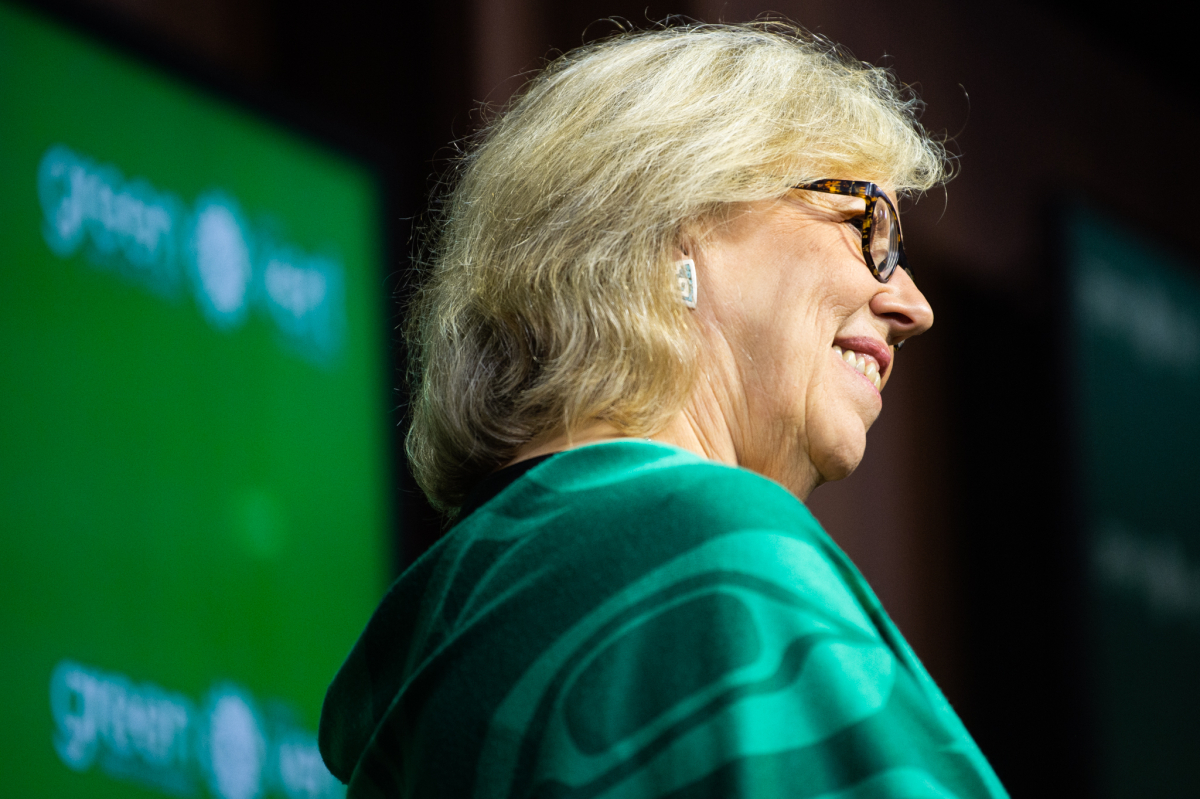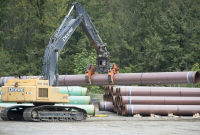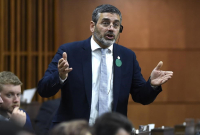Support strong Canadian climate journalism for 2025
What else does the federal Green party stand for along with its call to put Canada on a “war footing” against climate change?
The Greens have been propelled into prominence because of the potential of their signature issue to be a prime ballot-box question in the Oct. 21 federal election.
What else they stand for is less conspicuous. Their place on the political spectrum is obscured by their slogan: “Not Left. Not Right. Forward Together.”
Elizabeth May, the lawyer and environmentalist who has led the party since 2006, welcomes the scrutiny that has accompanied speculation her two-seat Commons caucus could grow to a handful or more.
In an interview with National Observer, May said this election “feels so different to me” from the last one, in 2015. She told anecdotes of unexpected support, donations and crowds from a pre-campaign tour of 33 communities across Canada.
“I hope for a minority Parliament,” she said, relishing the prospect of securing a strong climate action plan in return for supporting a government short of a 170-seat majority.
Canada's Green Party won't compromise
May, representing Saanich-Gulf Islands, was the only Green elected in the last election. Paul Manly won Nanaimo-Ladysmith in a byelection last May. Greens also hold seats in legislatures in British Columbia, New Brunswick, Ontario and P.E.I.
The centrepiece of the federal Green platform is Mission Possible, a 20-point national action plan to slash greenhouse gas emissions by rapidly phasing out fossil fuels, changing land use and industrial-agriculture practices, planting trees, improving the energy efficiency of homes and buildings and other actions.
May said the primary conditions for Green support of a minority government are adherence to the UN Intergovernmental Panel on Climate Change position — that global warming must be held below a 1.5 C increase above pre-industrial levels — and a pledge for a “dramatic transformational commitment” to cut carbon emissions in Canada.
“We will not, even for a first speech from the throne confidence vote, work with any party that isn’t fully committed to going off fossil fuels quickly,” May said.
“That means you can’t be building any pipelines, you can’t be fracking, you have to cancel the LNG (liquid natural gas) plant in Kitimat, you have to actually mean what you say — that we are committed to cutting 60 per cent of greenhouse gases by 2030.”
On non-environmental issues, May cited social justice proposals as a priority for the Greens. She said the proposals make the Greens “more progressive” than the New Democratic Party.
Key proposals are national pharmacare, a guaranteed livable income, free tuition for post-secondary students, elimination of existing student debt and a federal investment in colleges and universities.
They would increase revenues by hiking corporate taxes on large companies, such as banks and internet giants, but not on small or medium-sized businesses. They would cancel the Trans Mountain pipeline expansion and halt fossil fuel industry subsidies.
The Greens have submitted their election platform to the Parliamentary Budget Officer (PBO) for inspection and advice before announcing costed details. But May has promised that her party would balance the federal budget over five years. Their numbers are not available until after PBO inspection.
NDP MP's defection a 'game changer'
Also proposed is a non-partisan “collaborative council” of federal, provincial and municipal governments and Indigenous representatives. The aim would be to work out national policies on transport, housing, culture and other issues so as to facilitate shared goals and co-ordinated spending plans.
May said Canadians are frustrated by different levels of government contradicting one another and by the fact that municipal governments, which have heavy local responsibilities, control the least resources.
May said Quebec MP Pierre Nantel’s defection from the NDP to run for the Greens “is a game changer” that has spurred new support.
Seven weeks before the vote, the Greens had far more candidates nominated across Canada than the NDP. Rivalry between the two parties burst into full view this week over the defection of a group of former New Brunswick NDP provincial candidates to the Greens. The NDP has not nominated any candidates in the province and NDP leader Jagmeet Singh has never visited the province.
May welcomed the defectors but the wind in her sails died quickly because of remarks by Jonathan Richardson, the federal NDP's executive member for Atlantic Canada, that there was anecdotal evidence of racism against Singh, a Sikh who wears a turban.
Prominent New Democrats then accused May on social media of welcoming racists. She issued a statement that Richardson's remarks were taken out of context and there is no room for any form of discrimination in the Green Party. “We have zero tolerance for sexism, Islamophobia, antisemitism, misogyny, homophobia or hate speech of any kind," May said. "Canada’s strength lies in its diversity.
If the Greens win 12 seats, enough to get official party status in the Commons, half or more of those seats may come from B.C. alone.
“Climate change, maybe for the first time in Canadian history, could be the No. 1 issue at the polls,” David Merner, a lawyer and former federal Liberal candidate who’s now running for the Greens in Esquimalt-Saanich-Sooke, said in an interview with National Observer.
A reason Merner switched to the Greens after volunteering for the Liberals for 34 years, is that Prime Minister Justin Trudeau broke his promise that the 2015 election would be the last under the first-past-the-post system. Electoral reform is a key issue for the Greens.
In their 2015 platform, the Greens were faulted for failing to cost their proposed guaranteed living income and for putting such low costs on their pharmacare and daycare programs that they didn’t appear viable.
Seth Klein, a research associate with the Canadian Centre for Policy Alternatives at the time, noted a “disconnect” between the promises and the dollar figures. He’ll be watching for more convincing budgeting this time.
“There was a gap between the lofty words and the money, and you’ve got to see the money to know whether a lofty-sounding plan is actually a priority,” he said in an interview with National Observer.
Is Elizabeth May 'ready for prime time'?
Klein is now writing a book on “mobilizing Canada for the climate emergency.” He recently commissioned a national poll that showed “a large share of Canadians are already deeply worried about the climate crisis, and they are increasingly ready for bold and ambitious actions.”
Klein said he’ll be watching to see whether the Green platform repeats the “mistake” of pledging to balance the budget or to run surpluses, as the NDP and the Greens did last election. He said such fiscal policies don’t leave enough room for billions of spending on green infrastructure, from building upgrades and public transit to renewable energy projects.
Combined with a pledge to return carbon tax to consumers with a dividend, Klein said, the Greens' insistence on a balanced budget or surplus “massively undercuts the amount of money you can spend on green infrastructure.”
In a recent opinion piece for Postmedia, former NDP leader Tom Mulcair recently questioned whether May is “ready for prime time” even though she’s the longest-serving of the federal party leaders.
In her interview with National Observer, May, who said she had not seen the column, shot back: “I’m more than ready for prime time. I don’t have any problem addressing any aspect of my life or my character and I’m very proud of my record.”
Citing a remark she once made to a group of nuns, Mulcair suggested May says different things about abortion to different audiences. May said she has never wavered on the subject.
“The comments on abortion were convincing a roomful of nuns that a woman has the right to a safe and legal abortion and if you want to be pro-life, you have to support the life of women and support legal, safe abortion. I can’t help that the NDP clipped it and have used distorted clips from it over the years.”
It is fair to ask any federal leader for their views on abortion or LGBTTQ+ rights, as the Liberals had recently done by issuing an old clip of Conservative Leader Andrew Scheer speaking in the Commons, she said.
‘Careless’ policy on Indigenous people
Indigenous writer Robert Jago last spring branded the Greens’ policy paper on Indigenous Canadians as careless, containing spelling errors, contradictions and proposals that “come off as well-meaning, but with no grounding in reality.”
The paper has been updated somewhat. For example, a proposal to repeal the Indian Act within 10 years has been replaced by a proposal to allow First Nations to opt out of the Indian Act.
But Jago said in an interview that he still considers the Greens “superficial and careless” about Indigenous policy. May compounded his view when, at an Aug. 20 town hall in Sudbury, Ont., she answered yes when asked whether First Nations could “opt out of Canada.”
“It raises the stakes of conflicts within communities significantly AND it again shows the lack of care the Greens give to Indigenous policy,” Jago said on Twitter.
May said she was speaking hypothetically about the logic of self-determination but later checked the United Nations Declaration on the Rights of Indigenous Peoples and consulted experts and found “it cannot be done.”
A hot-button issue for some candidates in Quebec is Bill 21, legislation that bans teachers, police and other public officials from wearing religious symbols. May called it an affront to individual rights but said she knows “it’s a very, very uncomfortable line for a lot of our candidates.”
“It’s up to them to say what they think because we support the grassroots… and believe that every one of our MPs should vote according to what their constituents would want them to do or say, not based on what the leader says,” she added.
A persistent controversy for the Greens is their stance on Israel and Palestine. As of 2016, they supported the BDS movement, which calls for boycott, divestment and sanctions of the Israeli economy, but repealed the motion at a special meeting a few months later, substituting a position that still provokes criticism from both sides.
“It includes elements of boycotts and divestments and sanctions but it doesn’t endorse the BDS movement,” May said.
“It does say that, right now, as a party, we will always support a two-state solution, which means we have to support the right of the state of Israel to exist. That’s foundational. But it’s also clear that I see BDS as a movement that inadvertently strengthens the right wing in Israel.”
While the Greens will address many issues in their platform, May said, the election for her “is really about one thing.”
That is that Canada must urgently be put on a track away from “runaway global warming where there’s nothing humans can do about it.”






Comments
Isn't there international law, under the UN Charter, that gives "nations" or "peoples" a right to self-governance?
There are multiple ways the question could be interpreted, and there's insufficient context to even guess which might apply.
See:
https://en.wikipedia.org/wiki/Self-determination
And:
https://www.guidetoaction.org/parker/selfdet.html
There's far less argument for UN Charter Article II, paragraph 4, the one that forbids use of force by member states (like America) against other member states (like Iraq). Probably the more important one to enforce, since it strikes at the heart of self-determination. Let us know when you're done enforcing that one, and we'll get to the lower priorities.
Absolutely agree that the urgent priority for every nation is to confront the reality of climate change as urgently and effectively as possible. Thankfully we have the necessary technology, more and more, and only lack political will. We need media to speak very clearly about the real costs of climate change in response to every simplistic claim by Conservative proponents that we can't afford to act. It's clear we will pay vastly more if we don't act, and this will cost every Canadian monetarily, but also in terms of loss of food, water, national and personal security.
Irresponsible leaders like Trump seem to ignore the unavoidable devastation that will result from intensifying and more frequent hurricanes, rain drenching, floods, and wildfires. Now we learn that he thinks we should just be able to bomb our way out of hurricanes! Severe weather events can do vastly more harm than many military strikes that we could imagine, and all Trump's military arsenal and border walls will do nothing to keep Americans safe from his regressive policies and their consequences.
The Green Party and Ms. May may not have pat or elaborate answers to address every complex challenge, but at least they do their very best to answer thoughtfully and honestly, and promise to research further, and to act on evidence. I greatly prefer this to the practiced non-answers trotted out by our "professional" politicians from other parties. They've all seemingly attended the same politician school, and know how to turn every answer into a partisan jab, instead of answering what was asked. Greens deserve a chance, and I hope those who indicate climate change is their top concern, as it is mine, will give their vote to the party most consistently and transparently dedicated to treating this as the top concern.
Judging by the Greens in BC, they'll also do their best to bring the same commitment and effort to other files, and will do at least as well or better than the usual suspects.
I'm sorry, but the way the BC and PEI Greens have quickly warmed up to conservative ideals when compared to how the NDP has handled things, that is a sign that it's the Greens who support the same old, same old. They refuse to spend on megaprojects, but only because afraid to spend on anything!
The only way to improve things is to convince an NDP government to shift to a more environmental agenda.
Can you specify which Conservative ideals the Greens have warmed to? and give concrete examples with links?
I'll throw in some thoughts and articles here:
If the BC Greens were true to their claims, this article about "watering down" ambitions wouldn't have existed...or maybe the NDP ambitions would have been taken one step further:
* https://www.nationalobserver.com/2017/06/01/news/ndp-minority-governmen…
With Prince Edward Island, it should have been a given that the Greens would push the Liberal Party into a more socially responsible agenda. This article suggested otherwise:
* https://www.nationalobserver.com/2019/04/23/news/pei-makes-history-vaul…
One more related to the New Brunswick Greens that also never would have happened:
https://www.theglobeandmail.com/canada/article-new-brunswick-pc-leader-…
I've always been baffled by this position, that "every one of our MPs should vote according to what their constituents would want them to do or say, not based on what the leader says." First off, how are MPs to divine what their constituents (all of them? 50% + 1? Two-thirds?) want on each and every issue? And second, if Green MPs are free to vote on some criterion other than what the leader says, what are the leader's words worth? Are they aspirational but not binding? (Much like the Paris Accords?)
As leader of the Green Party E. May's words reflect the ideals of the grassroots and as such are of considerable worth. Green MPs are to vote according to the wishes of their constituents but with the caveat that MPs must adhere to the 6 basic principles that bind the Global Greens: Participatory Democracy
Nonviolence
Social justice
Sustainability
Respect for Diversity
Ecological Wisdom. As always the squeaky wheel gets the oil so an MP will only become aware of the wishes of his/her constituents if they bother to engage and it follows that it definitely is somewhat of a guessing game most often unduly influenced by big money.
Is she ready for prime time?? What an asinine sexist question. Justin Trudeau was a substitute teacher!! Harper was a failed economist!!! She is an accomplished lawyer. She is overly qualified given the last 2 prime ministers.
As we've seen in recent times a Conservative minority government would obstruct any efforts to fight climate change, and support for Ms. May's party would likely, despite her protests to the contrary, bleed away more Liberal than Conservative votes, making this the most likely outcome - and I suspect it wouldn't matter whether Conservatives were running Mr. Scheer, a dog, or even a bobble-head doll. No disrespect intended towards Mr. Scheer, the Conservative base is the Conservative base, and by the game's current rules, 30% of the votes nation wide is all you need to obtain a 'majority' in Canada.
Not surprisingly I find it difficult to be optimistic faced with the hell of first-past-the-post election in Canada.
The Liberals had a chance to fix this and dramatically change the game's incentives that drive the political behaviors of wedging, division, and paralysis. But even though they ran on it and were given a mandate they chose not to seriously try.
Of all the broken promises, why did it have to be the one that mattered the most?